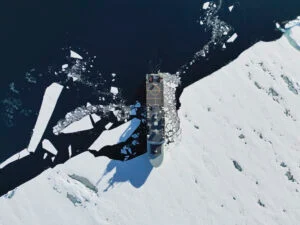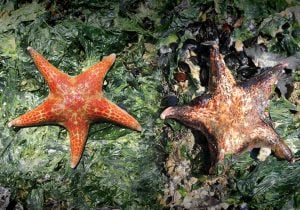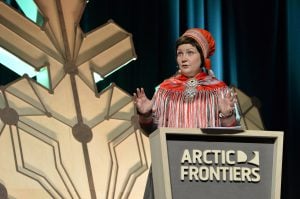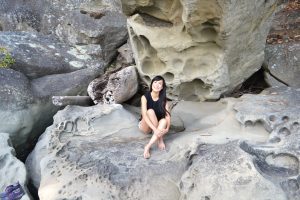
People & Culture
On thin ice: Who “owns” the Arctic?
As the climate heats up, so do talks over land ownership in the Arctic. What does Canadian Arctic Sovereignty look like as the ice melts?
- 4353 words
- 18 minutes
This article is over 5 years old and may contain outdated information.
Exploration

“If one could make it across the Northwest [Passage] in a single season, in a rowboat, it would scream to the profound effects climate change is having on the Arctic,” writes Kevin Vallely in the opening pages of his new book, Rowing the Northwest Passage: Adventure, Fear and Awe in a Rising Sea. The book, available today from Greystone Books, is an account of his attempt to row from Inuvik, N.W.T., to Pond Inlet, Nunavut, to draw attention to our warming planet.
Vallely and the three men — Paul Gleeson, Frank Wolf and Denis Barnett — who accompanied him on the 54-day, nearly 1,900-kilometre journey in the Arctic Joule may not have reached Pond Inlet, but between encounters with grizzly bears (yes, in the High Arctic), bowhead whales and muskox, they did see and hear how climate change is irrevocably altering the region and the way of life of the people who live there.
The passage below is excerpted from the book’s first chapter and sets the stage for a riveting, thought-provoking anthropocene-era adventure.
***
The tortured form of a decaying piece of ice glides past us and disappears again into the fog, a weary foot soldier returning home from some distant battle. The hair-raising action of the last couple days has frayed our nerves, and rowing our boat blindly around the Arctic headland of Cape Parry between large chunks of ice isn’t helping. The wind died at two-thirty this morning when a cold, stagnant Arctic air mass took its place and we jumped at our opportunity to move. This is the first calm weather we’ve experienced in days, and we treat it as a change in our fortunes. We couldn’t be more wrong.
It’s July 31, 2013, as Frank Wolf and I are rowing our four-person ocean rowing boat, the Arctic Joule, through the waters of the Amundsen Gulf on the Northwest Passage. Our teammates, Paul Gleeson and Denis Barnett, are resting in the stern cabin awaiting their turn on the oars. The visibility is a mere fifty yards, but we’re forced to travel solely by the aid of GPS and compass. We know we’re close to the cape from the steady thump of waves against cliff, but we see nothing.
The seas change as we round Cape Parry, with house-sized rollers, dark and foreboding, rising out of nowhere, sweeping beneath our hull and disappearing again into the murk. The rhythm of the swell is like the deep breathing of some oceanic giant rousing from its slumber, the crash of wave on rock its wake-up call.
We rise and fall with the pulse of the ocean, but we’re blind in this world of white. The steady rumble of surf to starboard helps us navigate, and the sound of breaking waves feels ominous. It’s not long before the echoes from the cape begin to surround us—one moment to starboard, then to port, then back to starboard again—and we become completely disoriented. “We need to get away from these cliffs,” I yell to Frank.
“It’s too dangerous this close to the cape.” The sound of breaking waves envelops us. “We’re spinning in circles,” Frank says after checking the GPS. “We’re caught in a current or something.”
We try everything to right ourselves, but it’s hopeless; our boat is gripped by an invisible force and we can’t regain control. In the confusion we fail to notice the building wind until it explodes upon us, driving us straight out to sea. Just offshore, about six miles away, sits the pack ice, and we’re now headed straight for it. If we reach it, we’ll be crushed.
I clamber into the cabin and check the navigation screen of our onboard GPS. I wonder if we have space to outrun the pack ice if we fight the wind and head south. The pack ice is big, the winds are intensifying, and we don’t have control of the boat.
“Not likely,” I mumble. As I stare blankly at the navigation screen, I see it. I hadn’t noticed it earlier on the handheld GPS, but there appears to be an island between us and the pack. Called Bear Island, it’s a mere speck, maybe a hundred yards wide, but if we can make it there, we might save ourselves. It’s our only chance.
We hold a straight line going southeast, 45 degrees to the wind-driven waves, and start rowing for all we’re worth. The seas continue to build and the fog remains thick. The waves are hitting us hard to starboard as we battle cross seas to a point several miles upwind from the island and make our turn. The scream of the wind dies immediately and we start to glide with it. “It’s like landing a paraglider on a postage stamp,” Frank says, the only words we’ve shared in the last thirty minutes. Surfing among the white-capped rollers, we race toward our invisible island in the fog.
When we’re within a mile or two, I scream to Paul and Denis to get out on deck. “Put on your dry suits, guys!” They scramble out of the cabin, fully aware of what’s been unfolding.
“Tell us when you see the island,” I shout. It becomes obvious now that facing backward in a rowboat can be very impractical at times.
“We’re four hundred meters out,” Frank yells (about four hundred yards), “Do you see anything?”
“Nothing,” Paul replies.?A moment later, Frank yells, “Two hundred meters out.”
“Nothing,” Paul says. “Wait a moment, I think I see—”?We all hear it before we see it—the deep, resonating thud of wave against cliff. I strain my neck over my left shoulder to see Bear Island ringed in steep cliffs, huge waves, and little hope. Our island refuge is no salvation at all.
Are you passionate about Canadian geography?
You can support Canadian Geographic in 3 ways:

People & Culture
As the climate heats up, so do talks over land ownership in the Arctic. What does Canadian Arctic Sovereignty look like as the ice melts?

Environment
As the impacts of global warming become increasingly evident, the connections to biodiversity loss are hard to ignore. Can this fall’s two key international climate conferences point us to a nature-positive future?

Environment
The uncertainty and change that's currently disrupting the region dominated the annual meeting's agenda

People & Culture
The family physician advocates for outdoor time with the PaRx nature prescription program